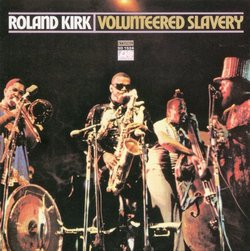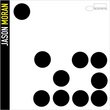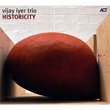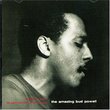| All Artists: Roland Kirk Title: Volunteered Slavery Members Wishing: 2 Total Copies: 0 Label: Wea Japan Original Release Date: 1/1/2008 Re-Release Date: 2/20/2008 Album Type: Import Genres: Jazz, Pop Styles: Modern Postbebop, Bebop Number of Discs: 1 SwapaCD Credits: 1 |
Search - Roland Kirk :: Volunteered Slavery
 | Roland Kirk Volunteered Slavery Genres: Jazz, Pop
Limited Edition Japanese pressing of this album comes house in a miniature LP sleeve. 2006. |
Larger Image |
CD DetailsSynopsis
Album Description Limited Edition Japanese pressing of this album comes house in a miniature LP sleeve. 2006. Similar CDs
|
CD ReviewsPositive vibrations in jazz Sergey Nikitin | Moscow, Russia | 08/07/2001 (5 out of 5 stars) "This is my favourite Kirk's record. And I prefer it to other jazz things in my collection - because of the spirit, energy and vibration. Kirk's energy is unmatched, and SLAVERY along with BLACKNUSS are the best points to feel it. If one should search for something new and fresh - ie what we are always looking for - suppose, it is still this old Kirk that will show you the way..." 4 1/2* Great Intro to Kirk! M. Allen Greenbaum | California | 09/07/2001 (4 out of 5 stars) "This is an excellent, albeit slightly uneven CD, by the great multi-instrumentalist, Rahsaan Roland Kirk. The first 5 tracks are studio session recorded in July 1969; the following five are live numbers form the 1968 Newport Jazz Festival. The CD has great sound, a beautiful choir on the first five tracks, and some interesting surprises. More on those later.The title track has a nice goopy Mingus-style groove with the choir voices echoing the sax at the end. (Kirk played with Mingus, by the way). One surprise here is the surprising, somewhat inexplicable, interpolation of "Hey Jude" towards the end. Next up is the beautiful "Spirits Up Above": This spiritual begins with the chorus upfront, then switches abruptly to a Spanish-tinged horn solo with chorus in background. This one cooks! Track 4 is similar in feeling, with a great driving bass by Vernon Martin. "My Cherie Amour" is...that "My Cherie Amour! (Stevie Wonder)." What is this strange thing? A pleasant enough excursion, but suspiciously commercial! (Surprise your friends...play this song first, then program your CD player to the very different track 1. Soulful flute solo, but on the whole, much too lightweight and a strange, unpretty vocal by Kirk. Unlike this song, the Bacharach pop/soul tune "I Say A Little Prayer" has a more interesting treatment, with a Latin beat and more texture. Kirk cuts loose on this, quoting "A Love Supreme" and then blowing some effective avante-garde over brooding bass (again, excellent work by V. Martin) and drums. Garage Jazz: Tracks 5-7 are Kirk's "One Ton" sandwiched between an introduction and some closing remarks to the crowd at Newport. This is a very post-bop blues, with a little 50's rock thrown in along with Batman theme riffs. This is garage jazz...simple loud bass...then a rapid going everywhere performance by Kirk. Yes, it's a little showy, and he vocalizes with the flute more noticeably than Ian Anderson does, but it winds up being a beautiful noise, and far better than Tull. Nice explosions of sound and a wonderfully simple/sloppy "garage band" rhythm section. This is music for the people.Kirk's three-part "Tribute to Coltrane" (another great with whom Kirk played) includes "Lush Life," "Afro-Blue," and "Bessie's Blues." "Lush Life" is taken at a slow pace and is indeed evocative of Trane. There are soaring notes and colors, and a tremendous range of notes. Kirk again finds a searching, spiritual form through the music, before settling into the main melody; the bass matched perfectly to Kirk's tones and mood. The other two sections are intense and swinging--excellent material. Kirk emulates the cascading sheets of sound and is superb. Long but interesting and well-played bass solo! "Three for the Festival" opens with great drumming by Jimmy Hopps. Kirk intensely vocalizes over his flute, which may not be to everyone's liking, but I think it's creative and fits the overall sound very well. `Three' ends with an overly long, flashy drum solo, but it must have pleased the audience with Kirk repeatedly yelling out the drummer's name, a la James Brown.A great introduction to Kirk newcomers, and an opportunity to hear Kirk both live and in the studio. Despite a hint of commercialism, this is well worth getting. Liner notes by Ed Williams, and personnel listed for each track. Recommended!" Rahsaan's Rippin' Rock , Gospel & Jazz Revue john37481 | Seattle USA | 03/06/2002 (5 out of 5 stars) "Live stuff on side two is ripping uptempo post-bop in the patented Rahsaan style. Side one is the mind-blow. Three original songs in gospel style, with gospel choir, all of them terrific & energetic & uplifting. What a great songwriter! "My Cherie Amour" confirms Rahsaan's status as an honorary rock-and-roller -- his vocal is NOISY & outrageous -- and I love it. He doesn't sing Stevie's words, just the "la la la" opening riff, noisily, before going into a charming and soulful lounge-bossa-nova flute arrangement of the tune. The juxtaposition of the raspy, "ugly" vocal & the almost-smooth-jazz flute is fearless & free. The album's ultimate kicker is Rahsaan's rip-rocking cover of "I Say a Little Prayer." Beginning with an out-of-tempo modal-noise section, and Kirk shouting, "they shot him down!! They shot him down to the ground!! But we're gonna say a little prayer!!" And he counts the tempo off & the band starts wailing on an original soul-rock riff arrangement of the tune featuring Rahsaan's awesome tenor. My guess is it's Rahsaan's tribute to Martin Luther King after the assassination, and the passion & intensity & beauty of it make me cry. Music-historical footnote: Rahsaan on side one of this album & on a couple other records attempted an acoustic jazz-rock fusion that had nothing to do with Miles's later electric jazz or Ornette's harmolodic funk (both of which I love). Duke Ellington attempted a fusion similar to Rahsaan's a few times in the mid-late-'60s and '70s. The style never caught on, but it really works when Rahsaan & Duke do it. The great rocking beats with the brilliant individualism of great jazz soloists."
|

 Track Listings (10) - Disc #1
Track Listings (10) - Disc #1

